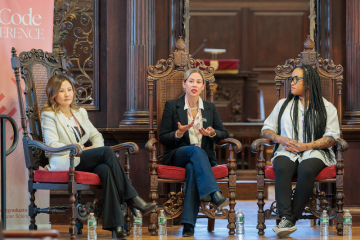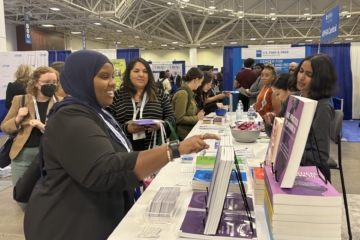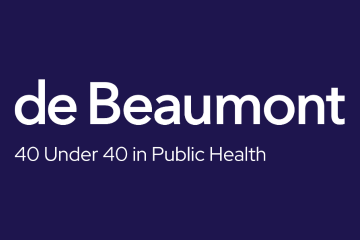Read Eric’s bio. See all 40 Under 40 honorees.
Five Questions for Eric

Eric gives a talk to the Vanderbilt Department of Health Policy.
1. What inspired you to enter the field of public health?
I backed into a career in public health almost by accident, though I’ve never looked back. My first task out of college was to study for the Tennessee General Assembly how we finance healthcare for the uninsured. As a result of our findings, I found myself helping to write Tennessee’s first ongoing population health improvement plan. Along the way, I’ve been inspired throughout my career by a series of mentors, first-class professionals, and amazing colleagues, each of whom could write a book on what it means to be a public servant.
2. What are the greatest challenges you face in your work?
I’m excited that more and more people across all walks of life are recognizing that health is the product of many things, not just healthcare. The challenge is in the “so what?” With concepts like Public Health 3.0, chief health strategists, and health in all policies, as public health professionals I think we need to be extra thoughtful about how we actually do engage other sectors. Learning to speak their language, understanding their drivers and measures of success, and building trusted relationships are just the start. We also have to bring it home into a usable process that people at the local, state, and federal levels can all find benefits in joining. Working at the local and state levels in Tennessee, I am both humbled and excited by the challenge of building such a process and seeing it come to life.
3. What would success in public health look like to you?
We spend a lot of money in our country taking care of a very unhealthy population. That said, we spend comparatively less than other wealthy countries on addressing upstream factors that lead to poor health (that we end up paying for at greater expense through our healthcare system). Unfortunately, no other country has solved the poor population health problem, but I would think that a potential solution could be if our country had a more holistic approach to improving health — one that takes into account the links between early childhood trauma, economic and social poverty, education, employment, and dozens of other factors. This is no easy feat, but I don’t believe we will achieve a truly healthy population until we can build the bridges between our siloed systems that are necessary to help people be healthy in the first place.
4. What’s a story or experience that keeps you going when you’re feeling challenged?
In college I had the privilege of interviewing former Ohio Rep. Tony Hall, an international champion on ending hunger. He told me a story about meeting Mother Theresa. They were walking through the streets of Kolkata, India, surrounded by widespread poverty. He asked Mother Theresa how she could hope to make a difference. Wasn’t her work just a drop in the bucket? She responded, “No, it’s a drop in the ocean, but without me, there’d be one less drop.” She then proceeded to help a dying man lying on the street to her hospital. After caring for him and helping him gain some comfort, Mother Theresa looked at Tony and said, “You do the thing that’s in front of you.” This story has been a guiding principle for me ever since. In doing the thing that’s in front of you, I believe we are given providential moments to add our drop to the ocean. If we all follow this advice, we can turn oceans of sadness and hurting into oceans of joy.
5. As a kid, what did you want to be when you grew up?
I have long felt the call to public service. When I was a little boy, maybe fresh out of preschool, I was a bit confused on terminology, though. I would tell people that when I grew up, I wanted to be a janitor. They would chuckle, not knowing that I really meant that I wanted to be a judge. It was perhaps a prophetic mistake, however, as I have come through my career to see the true public official as the caretaker who stewards resources with an eye towards the future, performs preventative maintenance, runs to the mess, and finds a way to make good out of sticky situations. This is exactly what we do in public health.




